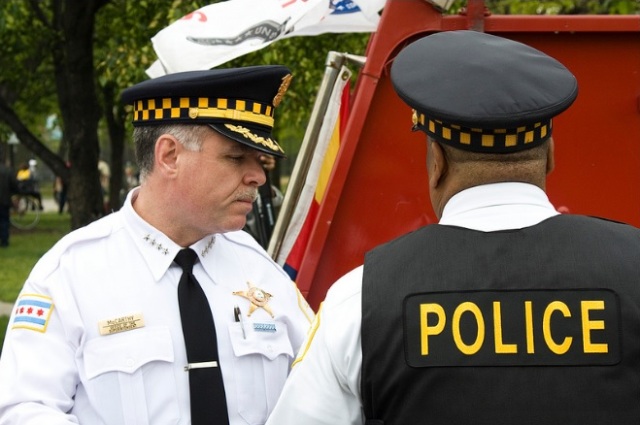The City Will Make More Police Officers Wear Body Cameras
By Kate Shepherd in News on Nov 30, 2015 5:27PM
Less than a week after the release of a harrowing video of Laquan McDonald being fatally shot by a Chicago cop, Mayor Rahm Emanuel and Chicago Police Superintendent Garry McCarthy announced that more police officers will be wearing video cameras on their bodies.
The body-worn camera program started in January and will be expanded into an additional six police districts by mid-2016, Emanuel and McCarthy announced in a statement Sunday. The body-worn cameras are attached to a cop's clothing and are used to record audio and video of certain police activities.
More than 4,600 videos have been captured totaling more than 745 hours since the pilot program was rolled out in Logan Square, Bucktown, Wicker Park and parts of Avondale and Humboldt Park in January. The cameras are meant to document interactions between officers and citizens during routine calls, investigatory stops, traffic stops, emergency vehicle response and evidence collection, according to the city.
"In addition to protecting police officers and citizens, cameras have been shown to reduce citizen complaints against police and are great tools for evidence gathering and training as they allow us to learn from actual encounters with the public," McCarthy said in the statement.
Emanuel and McCarthy have been catching heat from local activists and other concerned Chicagoans over their handling of McDonald's case in the past week, and some are calling for both of them to resign.
The body camera expansion will bring the program into one-third of the city, which will enhance the police force's transparency and credibility and strengthen the trust between the police and the community, Emanuel said in the statement. Some police accountability activists have been calling for the city to place body cameras on every police officer to prevent cases in which officers lie in police reports and testimonies about their interactions with the public.
A $1.1 million grant from the United States Department of Justice and $1.1 million in City funds will pay for the program and CPD has also applied for additional state grants.
